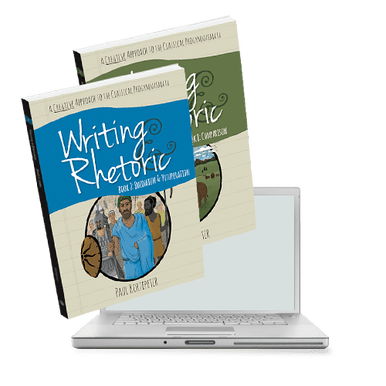Writing and Rhetoric 4

Required Materials:
Books and supplies are not included in the purchase of the course.
- Writing & Rhetoric Book 7: Encomium & Vituperation (Student Edition)
- Writing & Rhetoric Book 8: Comparison (Student Edition)
Optional Resources:
- Writing & Rhetoric Book 7: Encomium & Vituperation Audio Files
- Writing & Rhetoric Book 8: Comparison Audio Files
These audio files allow students to engage their sense of hearing and their listening intelligence as Greg Lowe delivers the readings aloud in a thoughtful manner.
Commonplace Journal (This can be a spiral-bound notebook, bound journal, or loose-leaf notebook.)

Mrs. Amy Morgan
[email protected]Amy Morgan is Scholé Academy’s Writing & Rhetoric and Well-Ordered Language Department chair. She earned her BA in liberal arts at St. John’s College in Annapolis, Maryland, and continued her education with an MA in TESOL/applied linguistics at Indiana University in Bloomington. For over 20 years, Amy has taught English to speakers of other languages in university, community, and private contexts. Additionally, Amy educated her own children at home in grades PreK–8. When Amy’s not teaching, you might find her serving families and children in vulnerable circumstances, hosting international guests, or taking a walk at a nearby state park.

Mrs. Amy Travis
[email protected]Amy Travis holds a BA in psychology and religious education with additional training in behavioral modification, counseling, and missions. She has lived in 4 countries outside the United States and studied multiple cultures and languages. She has been homeschooling her four children for over 20 years. She also has had the privilege of teaching adult ESL programs, high school history and literature courses, and middle school reading and grammar classes outside the home. On any given day, you will find Amy preparing lessons, conducting a new project with her children, experimenting with a creative meal for her family, or simply enjoying a restful time contemplating the goodness of God.

Fr. Nathan Dickinson
[email protected]Nathan Dickinson, incoming Chair of the Canterbury House of Studies, holds a M.Div. from Southern Baptist Theological Seminary and currently serves as the planting priest of Church of the Good Shepherd in Summersville, West Virginia. He is a West Virginia native who has had approximately a decade of teaching experiences in local churches and missionary settings. He has taught the Bible in Kenya, Zambia, Myanmar, and Jamaica, and has taught English (among other things) to students in the Christian school setting. He loves helping students see the beauty of God in Holy Scripture and helping students learn to engage in meaningful dialogue.
His two boys (Barnabas and Martin) keep his home life interesting and full of adventure! When he is not adventuring with his wife and boys, he is looking for a good cup of coffee, a good book, and a good conversation.
Quarter 1
Writing and Rhetoric: Book 7
- Weeks 1-6 Gathering tools for encomia and vituperation writing
- Weeks 7-8 Writing encomia and vituperations
Quarter 2
Writing and Rhetoric: Book 7
- Weeks 1-8 Writing encomia and vituperations
Quarter 3
Writing and Rhetoric: Book 8
- Weeks 1-8 Planning and writing a research paper (Book 7)
- Weeks 5-8 Gathering tools for comparison writing (Book 8)
(Note: The course map indicates overlap between the research paper unit and introducint the comparison writing unit. In part, this is because different instructors take different lengths of time on the research paper. In part, this is also because students may be completing final stages of the research paper unit as homework, while the comparison unit begins during class time.)
Quarter 4
Writing and Rhetoric: Book 8
- Weeks 1-8 Writing comparisons
![]() Computer: You will
need a stable, reliable computer, running with a processor with a speed of 1 GHz or better
on one of the following operating systems: Mac OS X with Mac OS 10.7 or later; Windows 8,
7, Vista (with SP1 or later), or XP (with SP3 or later). We do not recommend using an
iPad or other tablet for joining classes. An inexpensive laptop or netbook would be much
better solutions, as they enable you to plug an Ethernet cable directly into your computer.
Please note that Chromebooks are allowed but not preferred, as they do not support certain
features of the Zoom video conference software such as breakout sessions and annotation,
which may be used by our teachers for class activities.
Computer: You will
need a stable, reliable computer, running with a processor with a speed of 1 GHz or better
on one of the following operating systems: Mac OS X with Mac OS 10.7 or later; Windows 8,
7, Vista (with SP1 or later), or XP (with SP3 or later). We do not recommend using an
iPad or other tablet for joining classes. An inexpensive laptop or netbook would be much
better solutions, as they enable you to plug an Ethernet cable directly into your computer.
Please note that Chromebooks are allowed but not preferred, as they do not support certain
features of the Zoom video conference software such as breakout sessions and annotation,
which may be used by our teachers for class activities.
![]() High-Speed Internet Connection:
You will also need access to high-speed Internet, preferably accessible via Ethernet
cable right into your computer. Using Wi-Fi may work, but will not guarantee you the optimal
use of your bandwidth. The faster your Internet, the better. We recommend using a connection
with a download/upload speed of 5/1 Mbps or better. You can test your Internet connection here.
High-Speed Internet Connection:
You will also need access to high-speed Internet, preferably accessible via Ethernet
cable right into your computer. Using Wi-Fi may work, but will not guarantee you the optimal
use of your bandwidth. The faster your Internet, the better. We recommend using a connection
with a download/upload speed of 5/1 Mbps or better. You can test your Internet connection here.
![]() Webcam: You may
use an external webcam or one that is built in to the computer. Webcam Recommendations:
Good (PC only) | Best (Mac and PC)
Webcam: You may
use an external webcam or one that is built in to the computer. Webcam Recommendations:
Good (PC only) | Best (Mac and PC)
![]() Headset: We recommend
using a headset rather than a built-in microphone and speakers. Using a headset reduces the
level of background noise heard by the entire class. Headset Recommendations: USB | 3.5mm
Headset: We recommend
using a headset rather than a built-in microphone and speakers. Using a headset reduces the
level of background noise heard by the entire class. Headset Recommendations: USB | 3.5mm
![]() Zoom: We use a web
conferencing software called Zoom for our classes, which enables students and teachers to
gather from around the globe face to face in real time. Zoom is free to download and easy
to use.
Zoom: We use a web
conferencing software called Zoom for our classes, which enables students and teachers to
gather from around the globe face to face in real time. Zoom is free to download and easy
to use.  To
download Zoom:
To
download Zoom:
- Visit zoom.us/download.
- Click to download the first option listed, Zoom Client for Meetings.
- Open and run the installer on your computer.
- In August, students will be provided with instructions and a link for joining their particular class.
![]() Scanner: In this
class, students frequently submit homework assignments by scanning pages from their workbooks.
Students and/or their parents should have easy access to a scanner and the ability to use it.
Scanner: In this
class, students frequently submit homework assignments by scanning pages from their workbooks.
Students and/or their parents should have easy access to a scanner and the ability to use it.
Step 1
Step 2
Step 3
Step 4
Explore our courses!
First, read the available course descriptions, noting prerequisites, target grades, and course objectives. If you think your student is prepared for the course, go ahead and register. After registration, a placement assessment may be provided to students, depending on the course and the student's previous enrollment with Scholé Academy. Registration is finalized when the student's placement assessment has been returned by the course instructor with placement confirmation.
All Courses | By Grade
Read the Student-Parent Handbook.
Please take careful note of our teaching philosophy, our technology requirements, our school policies, the parent agreement, and the distinctions between our grade levels.
Double-check the course section dates and times.
Make sure they don't conflict with other activities in your schedule or other courses you are purchasing. Our system will not catch double-bookings!
You're ready to add course selections to your cart!
Our Assistant to the Principal will be in touch with you after your enrollment to help you with next steps, including any placement evaluations that may be required for your course selections.
This registration will be finalized when the student's placement assessment has been returned by the course instructor with placement confirmation.
